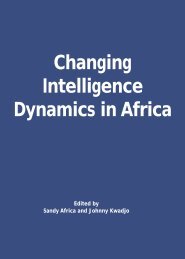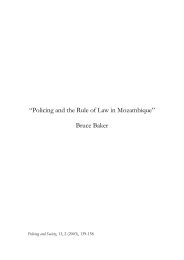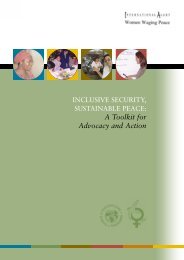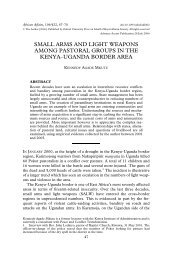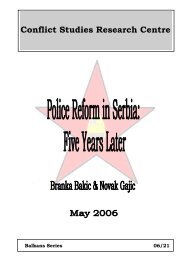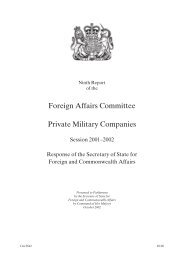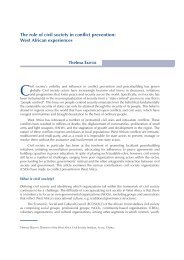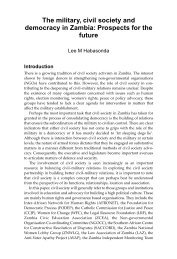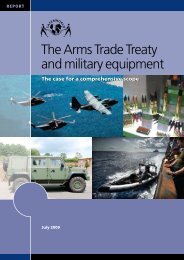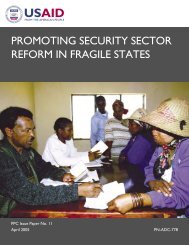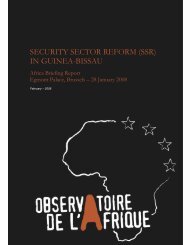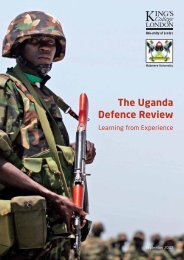AFGHANISTAN'S ELECTION CHALLENGES
AFGHANISTAN'S ELECTION CHALLENGES
AFGHANISTAN'S ELECTION CHALLENGES
You also want an ePaper? Increase the reach of your titles
YUMPU automatically turns print PDFs into web optimized ePapers that Google loves.
Afghanistan’s Election Challenges<br />
Crisis Group Asia Report N°171, 24 June 2009 Page 23<br />
includes the minister himself. This is problematic as<br />
many of the offences in the last election related to the<br />
48-hour silence period just before the poll and demanded<br />
immediate action, not referral. More broadly, a government-appointed<br />
commission is not an appropriate<br />
arbitrator. Rather, the electoral media commission,<br />
appointed by the IEC, should have powers of sanction,<br />
while RTA and private channels should be<br />
closely scrutinised for bias.<br />
B. 15SECURING THE VOTE<br />
Elections not only reflect the state of security but can<br />
also affect it, adding to instability if perceived as unfair<br />
or helping stabilise a polity if people’s voices are<br />
heard. The UN has called on members of the armed<br />
opposition to participate in the elections. 172 While<br />
there is value in reaching out to disaffected communities,<br />
particularly in local elections, to ensure more<br />
equitable representation, seeking to draw in the Taliban<br />
itself at this stage is far more problematic, and indeed<br />
naïve. Given that the strategic momentum is currently<br />
felt to lie with the insurgents, they have demonstrated<br />
little interest in participating. A careful watch must<br />
also be kept during the election on any collusion –<br />
which has been fiercely denied – between the registered<br />
political party Hizb-e Islami (Afghanistan) 173<br />
and the armed group led by Gulbuddin Hekmatyar. 174<br />
172 The UN Special Representative of the Secretary-General<br />
(SRSG) Kai Eide was reported to have said: “Call it<br />
reconciliation, or the peace process, whatever you want, but I<br />
believe that the opposition should know that those who want<br />
to take part in the election and respect the constitution should<br />
have an option to do that”. Jon Boone, “Afghanistan UN<br />
chief urges Taliban to contest presidential poll”, The Guardian,<br />
3 May 2009.<br />
173 It gained registration only after the 2005 election. It claims<br />
to have up to 40 members – all represented as individuals –<br />
in the Wolesi Jirga. See Crisis Group Report, Afghanistan’s<br />
New Legislature: Making Democracy Work, op. cit., p. 8.<br />
174 Hizb-e Islami (Afghanistan) leader Abdul Hadi Arghandiwal<br />
has been at pains to emphasise that ties have been broken:<br />
“The party has no splinters and has no problems. Members<br />
of the party are those who were in the party in the past<br />
too. We have not had any relations with the esteemed<br />
Hekmatyar after he was expelled from Iran and we have no<br />
links with him”. “Afghan faction to make alliance with likeminded<br />
groups in coming election”, Tolo TV, 10 July 2008,<br />
translation by BBC Monitoring. Hekmatyar in turn states:<br />
“[T]hey are neither Hizb-e Islami representatives nor can<br />
they speak on behalf of the party. The party believes in<br />
jihad against the occupiers”. www.shahadatnews.com, 3<br />
August 2008. There remains however great respect for<br />
Hekmatyar, with one Hizb-e Islami (Afghanistan) organiser<br />
in the north describing them as one “family” currently go-<br />
In terms of armed intimidation, it is not just the insurgents<br />
who are feared. One political party activist<br />
stressed: “we are hostages because of the lack of disarmament”.<br />
175 Although the 2008-2009 voter registry<br />
update saw fewer security incidents than had been<br />
widely predicted, registration centres were still unable<br />
to open in eight districts – five in Helmand, two in<br />
Ghazni and one in Wardak 176 – and election staff<br />
have been threatened and kidnapped; 177 female workers,<br />
in particular, have been intimidated, making hiring<br />
difficult. Violent incidents included a convoy of<br />
election materials attacked in Wardak, 178 and attacks<br />
on people found with voter cards at Taliban checkpoints.<br />
Two provincial council candidates were murdered<br />
in May, one in Ghazni and one in Khost, and a<br />
number of police have been killed near voter registration<br />
centres, although they are an ongoing target for insurgent<br />
attacks. It is difficult to untangle the exact nature<br />
of individual incidents, whether they are criminal, factional<br />
or insurgent in nature. But there has, as yet, not<br />
been an all-out systematic assault on the electoral<br />
process.<br />
Possible reasons have been widely debated. Some<br />
point to registration being done only in district centres,<br />
the most protected places in provinces, while polling<br />
is to take place in 7,000 polling centres down to village<br />
level. Others claim that insurgents themselves see the<br />
voter card as a useful ID. 179 Yet others believe that<br />
individual commanders may seek to influence the<br />
electoral process – particularly in local elections. One<br />
representative of a small “democratic” party spoke of<br />
travelling to Pakistan to talk with Taliban and Hizb-e<br />
Islami commanders to convince them to allow him to<br />
campaign, describing this as: “using undemocratic<br />
means to get democratic power”. 180<br />
Public statements by the insurgents have been restrained<br />
– as they tend to be on events and issues to do with<br />
ing through some internal squabbles. Crisis Group interand<br />
Paktika election staff were kid-<br />
view, Hizb-e Islami (Afghanistan) official, Mazar-e Sharif,<br />
2 February 2009.<br />
175 Crisis Group interview, leader of small democratic party,<br />
Kabul, 27 January 2009.<br />
176 Crisis Group interview, IEC deputy chief electoral officer<br />
Zekria Barakzai, 14 May 2009.<br />
177 For instance in Farah<br />
napped and then later released. FEFA report on voter registration,<br />
Third Phase, p. 5.<br />
178 ELECT Weekly Electoral Report, no. 27, 3-10 November<br />
2008, p. 7.<br />
179 Jessica Leeder, “Taliban using voter cards as ‘visas’”,<br />
Globe and Mail, 13 May 2009.<br />
180 Crisis Group interview, Kabul,<br />
19 January 2009.



